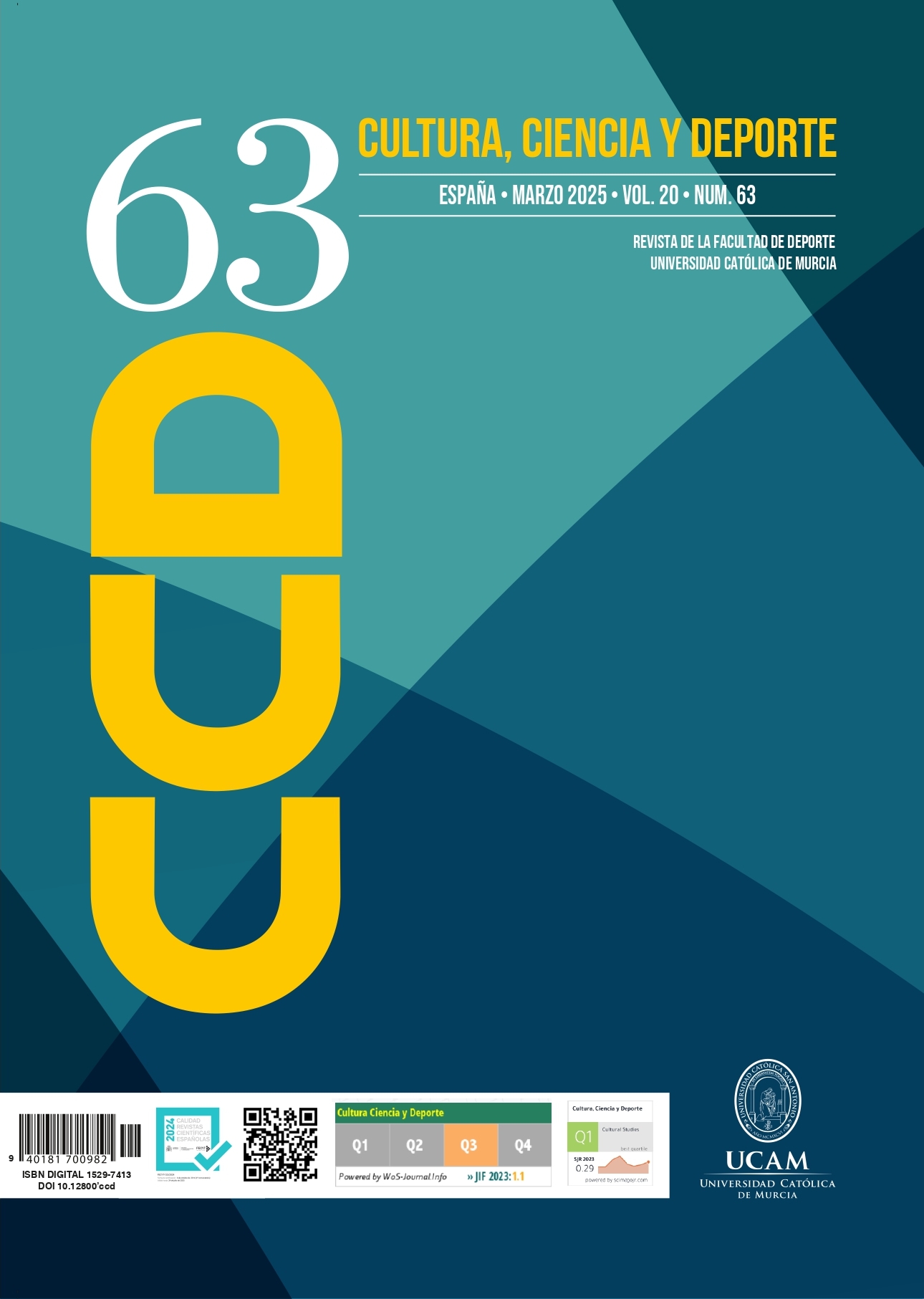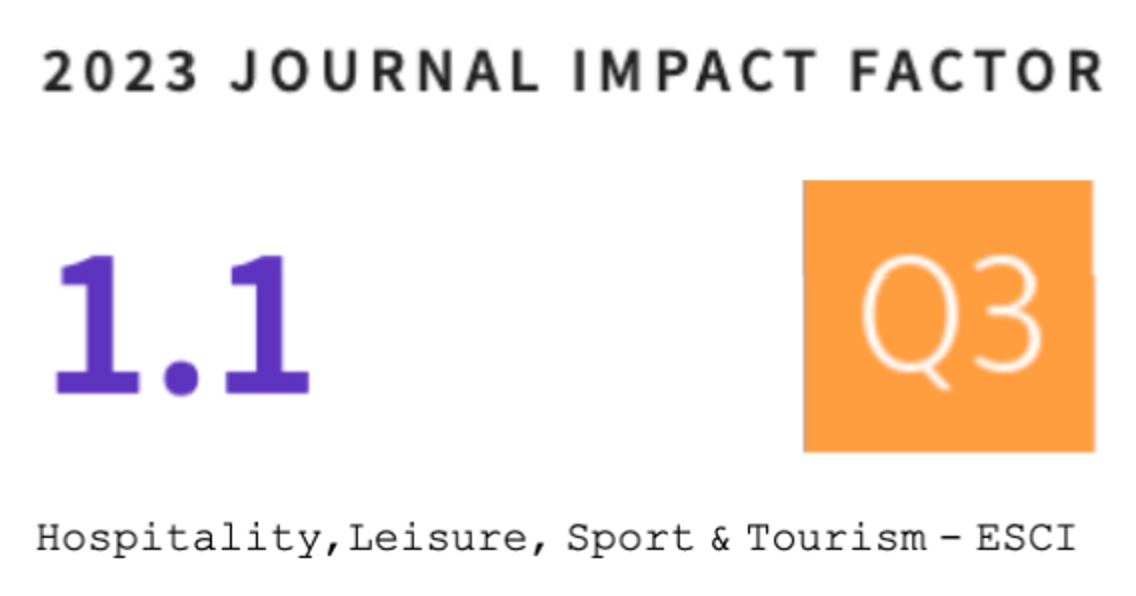Eficacia Comparativa del Entrenamiento con Peso en Hockey Sobre Patines
DOI:
https://doi.org/10.12800/ccd.v20i63.2305Resumen
Este estudio evaluó el impacto de un programa de entrenamiento de 8 semanas en dos grupos de jugadores, uno que
realizó entrenamiento con pesas libres y el otro entrenamiento con peso corporal. La muestra consistió en 14 atletas con una edad media de 22,6 años. Se realizaron evaluaciones de la fuerza de tiro antes y después del programa, midiendo la velocidad, la aceleración y la fuerza del tiro. El entrenamiento con pesas libres incluyó ejercicios con mancuernas y barras, mientras que el entrenamiento con peso corporal incluyó sentadillas, flexiones y planchas. Las sesiones se realizaron dos veces por semana, con un progreso gradual en el número de series y repeticiones. Los análisis estadísticos se realizaron utilizando el software GraphPad Prism, con una significancia establecida en p < 0,05. La distribución de los datos se probó utilizando la prueba de Shapiro-Wilk, y las comparaciones entre las evaluaciones previas y posteriores a la intervención se realizaron con pruebas t pareadas. Los resultados mostraron mejoras significativas en la velocidad, la aceleración y la fuerza del tiro en el grupo de entrenamiento con pesas libres, mientras que el grupo de entrenamiento con peso corporal no mostró cambios significativos. Se concluyó que el entrenamiento con pesas libres es más eficaz para mejorar la fuerza de tiro en jugadores de hockey sobre patines.
Citas
Argus, C. K., Gill, N. D., Keogh, J. W. L., McGuigan, M. R., & Hopkins, W. G. (2012). Effects of two contrast training programs on jump performance in rugby union players during a competition phase. International Journal of Sports Physiology and Performance, 7(1), 68–75. https://doi.org/10.1123/ijspp.7.1.68
Baechle, T. R., & Earle, R. W. (2019). Weight training: steps to success. Human Kinetics.
Cabarkapa, D., Eserhaut, D. A., Fry, A. C., Cabarkapa, D. V., Philipp, N. M., Whiting, S. M., & Downey, G. G. (2022). Relationship between upper and lower body strength and basketball shooting performance. Sports, 10(1), 139. https://doi.org/10.3390/sports10100139
Cadore, E. L., Pinto, R. S., Lhullier, F. L. R., Correa, C. S., Alberton, C. L., Pinto, S. S., Almeida, A. P. V., Tartaruga, M. P., Silva, E. M., & Kruel, L. F. M. (2010). Physiological effects of concurrent training in elderly men. International Journal of Sports Medicine, 31(10), 689–697. https://doi.org/10.1055/s-0030-1261895
Čerňanová, V. C., Čerňan, J., Danková, Z., & Siváková, D. (2018). Body composition and physical performance of Slovak ice hockey players with different training approach during pre-season preparation. Anthropological Review, 81(3), 379–392. https://doi.org/10.2478/anre-2018-0033
Cotter, A. (2022). Return to sport following anterior cruciate ligament reconstruction: Women’s field hockey. Journal of Women’s Sports Medicine, 2(2), 57–69. https://doi.org/10.53646/jwsm.v2i2.24
Ferreira, A., Enes, C., Leao, C., Goncalves, L., Clemente, F. M., Lima, R., Bezerra, P., & Camoes, M. (2018). Relationship between power condition, agility, and speed performance among young roller hockey elite players. Human Movement, 20, 24–30. https://doi.org/10.5114/hm.2019.79040
García, J., Ibáñez, S. J., Martinez De Santos, R., Leite, N., & Sampaio, J. (2013). Identifying basketball performance indicators in regular season and playoff games. Journal of Human Kinetics, 36, 161–168. https://doi.org/10.2478/hukin-2013-0016
Grgic, J., Schoenfeld, B. J., & Mikulic, P. (2021). Effects of plyometric vs. resistance training on skeletal muscle hypertrophy: A review. Journal of Sport and Health Science, 10(5), 530–536. https://doi.org/10.1016/j.jshs.2020.06.010
Ho, S. S., Dhaliwal, S. S., Hills, A. P., & Pal, S. (2012). The effect of 12 weeks of aerobic, resistance or combination exercise training on cardiovascular risk factors in the overweight and obese in a randomized trial. BMC Public Health, 12, 704. https://doi.org/10.1186/1471-2458-12-704
Huard Pelletier, V., Glaude-Roy, J., Daigle, A.-P., Brunelle, J.-F., Bissonnette, A., & Lemoyne, J. (2021). Associations between testing and game performance in ice hockey: A scoping review. Sports, 9(9), 117. https://doi.org/10.3390/sports9090117
Kuramoto, N., Nomura, K., Kohno, D., Kitamura, T., Karsenty, G., Hosooka, T., & Ogawa, W. (2021). Role of PDK1 in skeletal muscle hypertrophy induced by mechanical load. Scientific Reports, 11, 3447. https://doi.org/10.1038/s41598-021-83098-z
Lagrange, S. (2022). The optimal time window for complex training in order to increase repeated sprint ability in professional ice hockey players. International Journal of Strength and Conditioning, 2. https://doi.org/10.47206/ijsc.v2i1.106
Leong, C. H., McDermott, W. J., Elmer, S. J., & Martin, J. C. (2014). Chronic eccentric cycling improves quadriceps muscle structure and maximum cycling power. International Journal of Sports Medicine, 35(7), 559–565. https://doi.org/10.1055/s-0033-1358471
Murphy, A., Burgess, K., Hall, A. J., Aspe, R. R., & Swinton, P. A. (2023). The effects of strength and conditioning interventions on sprinting performance in team sport athletes: A systematic review and meta-analysis. The Journal of Strength & Conditioning Research, 37(6), 1692. https://doi.org/10.1519/JSC.0000000000004440
Novak, D., Loskot, J., Roczniok, R., Opath, L., & Stastny, P. (2022). Training with a heavy puck elicits a higher increase of shooting speed than unloaded training in midget ice hockey players. Journal of Human Kinetics, 82, 191–200. https://doi.org/10.2478/hukin-2022-0045
Rodríguez, F. A. (1991). Functional evaluation of the roller hockey player. Apunt Educ Física i Esports, 1991(23), 51–62. Savaş, S., Yüksel, M. F., & Uzun, A. (2018). The effects of rapid strength and shooting training applied to professional basketball players on the shot percentage level. Universal Journal of Educational Research, 6(8), 1569–1574. https://doi.org/10.13189/ujer.2018.060717
Scantlebury, S., Till, K., Sawczuk, T., Weakley, J., & Jones, B. (2018). Understanding the relationship between coach and athlete perceptions of training intensity in youth sport. Journal of Strength and Conditioning Research, 32(11), 3239–3245. https://doi.org/10.1519/JSC.0000000000002204
Secomb, J. L., Dascombe, B. J., & Nimphius, S. (2021). Importance of joint angle-specific hip strength for skating performance in semiprofessional ice hockey athletes. The Journal of Strength & Conditioning Research, 35(10), 2599. https://doi.org/10.1519/JSC.0000000000004087
Seipp, D., Quittmann, O. J., Fasold, F., & Klatt, S. (2023). Concurrent training in team sports: A systematic review. International Journal of Sports Science & Coaching, 18(6), 1342–1364. https://doi.org/10.1177/17479541221099846
Stastny, P., Tufano, J. J., Kregl, J., Petr, M., Blazek, D., Steffl, M., ... & Zmijewski, P. (2018). The role of visual feedback on power output during intermittent Wingate testing in ice hockey players. Sports, 6(2), 32. https://doi.org/10.3390/sports6020032
Suchomel, T. J., Bailey, C. A., Sole, C. J., Grazer, J. L., & Beckham, G. K. (2015). Using reactive strength index-modified as an explosive performance measurement tool in Division I athletes. The Journal of Strength & Conditioning Research, 29(3), 899. https://doi.org/10.1519/JSC.0000000000000743
Teixeira, J. E., Forte, P., Ferraz, R., Branquinho, L., Silva, A. J., Monteiro, A. M., & Barbosa, T. M. (2022). Integrating physical and tactical factors in football using positional data: A systematic review. PeerJ, 10, e14381. https://doi.org/10.7717/peerj.14381
Teixeira, J. E., Forte, P., Ferraz, R., Leal, M., Ribeiro, J., Silva, A. J., Barbosa, T. M., & Monteiro, A. M. (2021). Monitoring accumulated training and match load in football: A systematic review. International Journal of Environmental Research and Public Health, 18, 3906. https://doi.org/10.3390/ijerph18083906
Thompson, W. R. (2018). Worldwide survey of fitness trends for 2019. ACSM’s Health & Fitness Journal, 22(6), 10–17. https://doi.org/10.1249/FIT.0000000000000438
Vizcaya Pérez, F. J., Fernández Del Olmo, M., & Martín Acero, R. (2005). Specific strength training of the flick in field hockey through over–weighted balls. RPCD, 2005(1), 40–48. https://doi.org/10.5628/rpcd.05.01.40
Wewege, M., van den Berg, R., Ward, R. E., & Keech, A. (2017). The effects of high-intensity interval training vs. moderate-intensity continuous training on body composition in overweight and obese adults: A systematic review and meta-analysis. Obesity Reviews, 18(6), 635–646. https://doi.org/10.1111/obr.12532
Williams, M. D., Ramirez-Campillo, R., Chaabene, H., & Moran, J. (2021). Neuromuscular training and motor control in youth athletes: A meta-analysis. Perceptual and Motor Skills, 128(6), 1975–1997. https://doi.org/10.1177/00315125211029006
Zemková, E., & Zapletalová, L. (2022). The role of neuromuscular control of postural and core stability in functional movement and athlete performance. Frontiers in Physiology, 13. https://doi.org/10.3389/fphys.2022.1005661
Zhang, S., & Zhang, Z. (2022). Application of optimized strength training in university basketball. Revista Brasileira de Medicina do Esporte, 29(1), e2022_0258. https://doi.org/10.1590/1517-8692202329012022_0258
Descargas
Publicado
Cómo citar
Número
Sección
Licencia
Derechos de autor 2025 Creative Commons Attribution License

Esta obra está bajo una licencia internacional Creative Commons Atribución-NoComercial-CompartirIgual 4.0.
Los autores que publican en esta revista están de acuerdo con los siguientes términos:- Los autores conservan los derechos de autor y garantizan a la revista el derecho de ser la primera publicación del trabajo al igual que licenciado bajo una Creative Commons Attribution License que permite a otros compartir el trabajo con un reconocimiento de la autoría del trabajo y la publicación inicial en esta revista.














